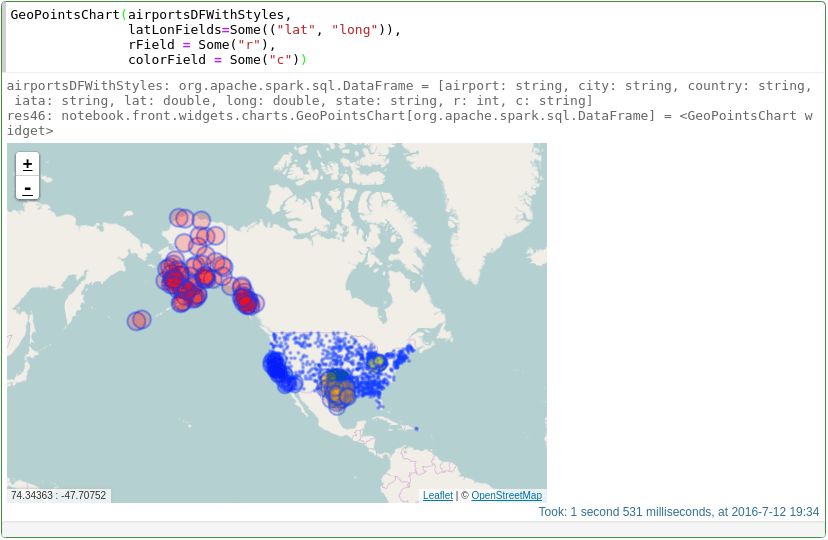The Spark Notebook is an open source notebook aimed at enterprise environments, providing data scientists and data engineers with an interactive web-based editor combining Scala code, SQL queries, Markup and JavaScript in a collaborative manner to explore, analyse and learn from massive data sets.
The notebook offers an easy way to prototype Scala/Spark code with SQL queries to analyse data.
Spark is a general-purpose framework for cluster computing.
Features include:
- Multiple Spark Context Support – each notebook spawns a new JVM with its own SparkSession instance.
- Perform reproducible analysis with Scala, Apache Spark, and the Big Data ecosystem.
- Visualize the output of SQL queries directly as tables and charts.
- Focused on Scala, SQL and Apache Spark.
- Supports exclusively the Scala programming language, the Unpredicted Lingua Franca for Data Science and extensibly exploits the JVM ecosystem of libraries to drive an smooth evolution of data-driven software from exploration to production.
- Components in the Spark Notebook are dynamic and reactive.
- Run Spark Notebook from a secured YARN cluster, Amazon EMR, and Mesosphere Data Center Operating System (DCOS).
- Various widgets to enrich the interaction with the data.
- HTML widgets – dedicated to display and interact with data elements. They can be useful to show samples of large datasets, to choose specific data points, or to show continuous updates of streaming data.
- Graphical widgets – customizable charts ranging from simple line and bar charts to advanced pivot tables and geo-charts.
- Metadata driven configuration. The metadata in the notebook allows you to configure many runtime aspects of the Spark Notebook, any cluster it connects to, specific library dependencies needed, as well as JVM parameters and definition of variables that describe your environment.
This software requires Java 7 or higher.
Website: spark-notebook.io
Support: Quick Start Guide, GitHub Code Repository, Gitter, Mailing List
Developer: Andy Petrella and contributors
License: Apache License 2.0

Spark Notebook is written in JavaScript. Learn JavaScript with our recommended free books and free tutorials.
Return to Data Science Notebooks
| Popular series | |
|---|---|
| The largest compilation of the best free and open source software in the universe. Each article is supplied with a legendary ratings chart helping you to make informed decisions. | |
| Hundreds of in-depth reviews offering our unbiased and expert opinion on software. We offer helpful and impartial information. | |
| The Big List of Active Linux Distros is a large compilation of actively developed Linux distributions. | |
| Replace proprietary software with open source alternatives: Google, Microsoft, Apple, Adobe, IBM, Autodesk, Oracle, Atlassian, Corel, Cisco, Intuit, and SAS. | |
| Awesome Free Linux Games Tools showcases a series of tools that making gaming on Linux a more pleasurable experience. This is a new series. | |
| Machine Learning explores practical applications of machine learning and deep learning from a Linux perspective. We've written reviews of more than 40 self-hosted apps. All are free and open source. | |
| New to Linux? Read our Linux for Starters series. We start right at the basics and teach you everything you need to know to get started with Linux. | |
| Alternatives to popular CLI tools showcases essential tools that are modern replacements for core Linux utilities. | |
| Essential Linux system tools focuses on small, indispensable utilities, useful for system administrators as well as regular users. | |
| Linux utilities to maximise your productivity. Small, indispensable tools, useful for anyone running a Linux machine. | |
| Surveys popular streaming services from a Linux perspective: Amazon Music Unlimited, Myuzi, Spotify, Deezer, Tidal. | |
| Saving Money with Linux looks at how you can reduce your energy bills running Linux. | |
| Home computers became commonplace in the 1980s. Emulate home computers including the Commodore 64, Amiga, Atari ST, ZX81, Amstrad CPC, and ZX Spectrum. | |
| Now and Then examines how promising open source software fared over the years. It can be a bumpy ride. | |
| Linux at Home looks at a range of home activities where Linux can play its part, making the most of our time at home, keeping active and engaged. | |
| Linux Candy reveals the lighter side of Linux. Have some fun and escape from the daily drudgery. | |
| Getting Started with Docker helps you master Docker, a set of platform as a service products that delivers software in packages called containers. | |
| Best Free Android Apps. We showcase free Android apps that are definitely worth downloading. There's a strict eligibility criteria for inclusion in this series. | |
| These best free books accelerate your learning of every programming language. Learn a new language today! | |
| These free tutorials offer the perfect tonic to our free programming books series. | |
| Linux Around The World showcases usergroups that are relevant to Linux enthusiasts. Great ways to meet up with fellow enthusiasts. | |
| Stars and Stripes is an occasional series looking at the impact of Linux in the USA. | |
